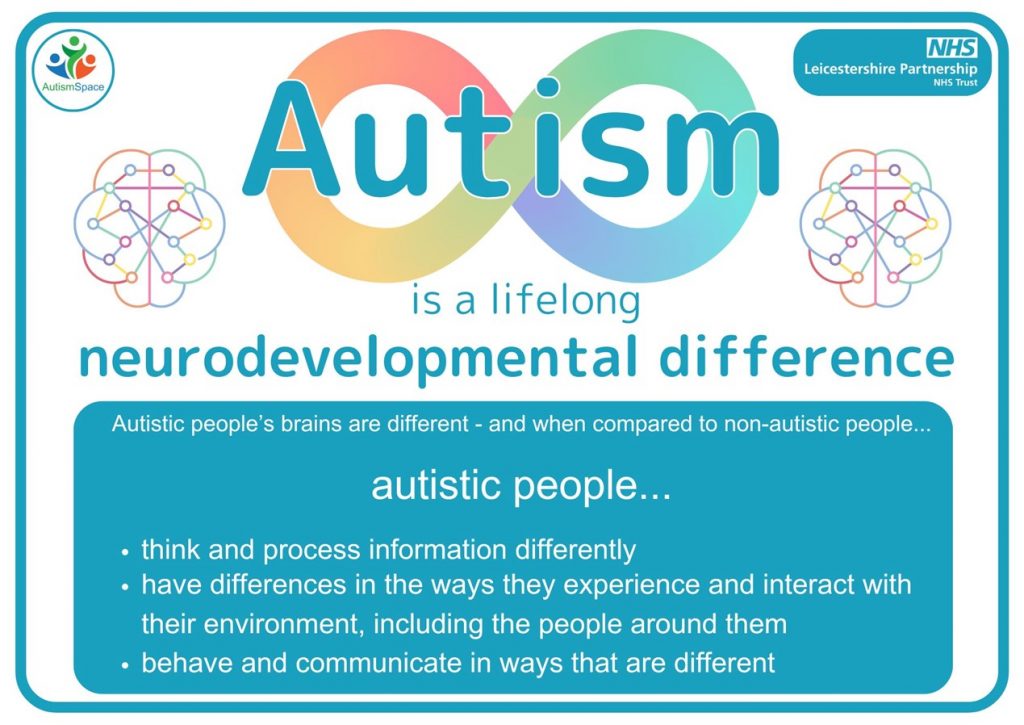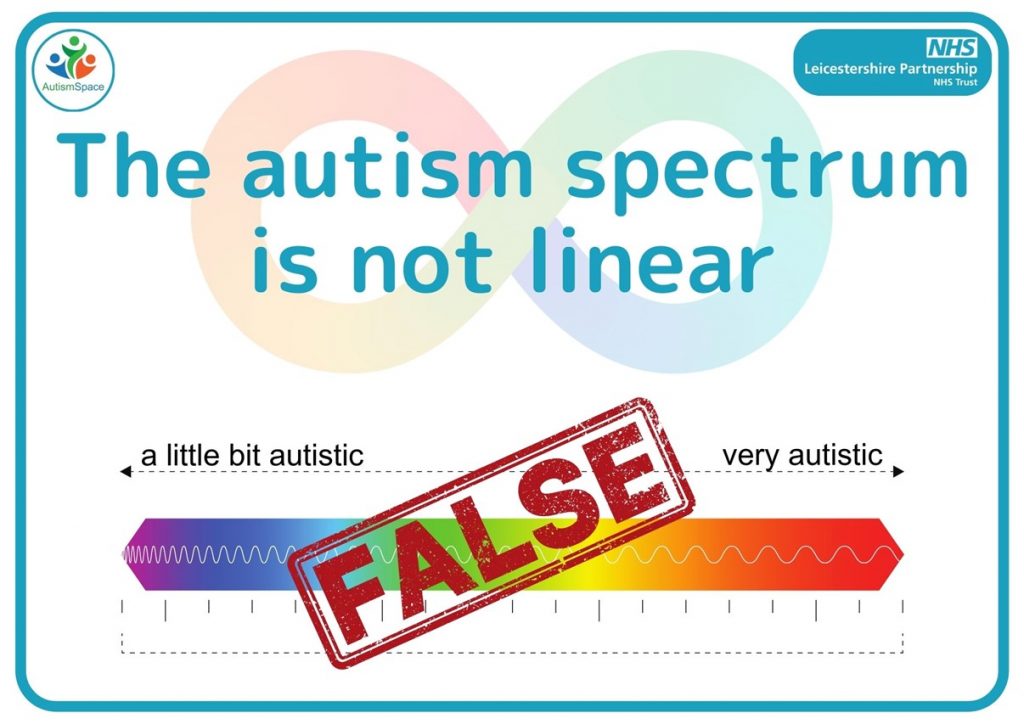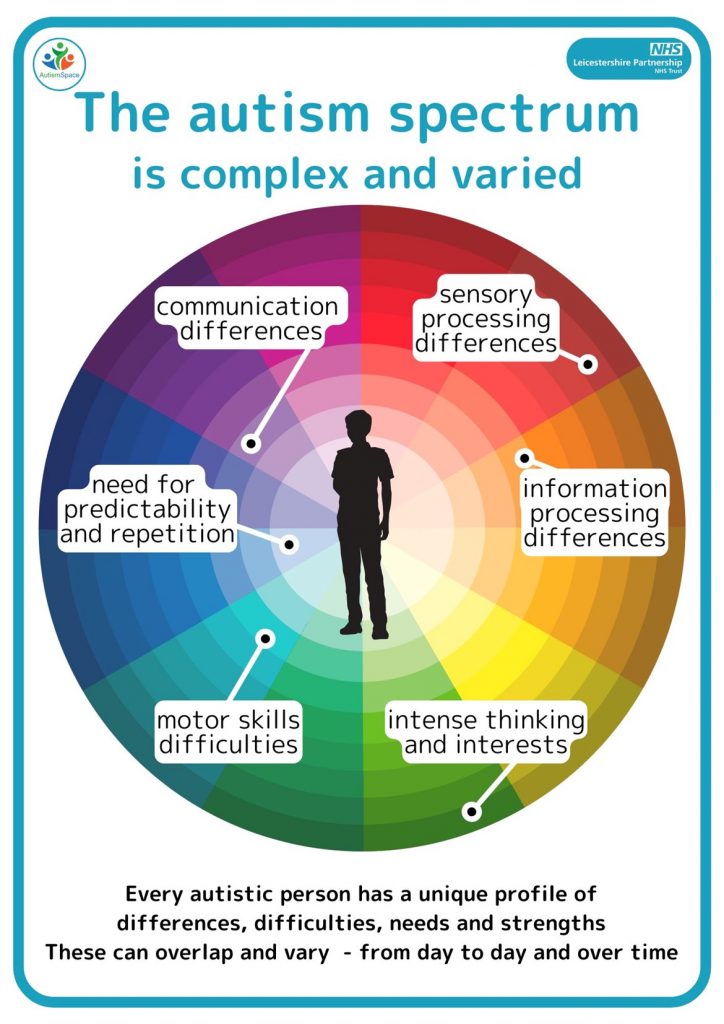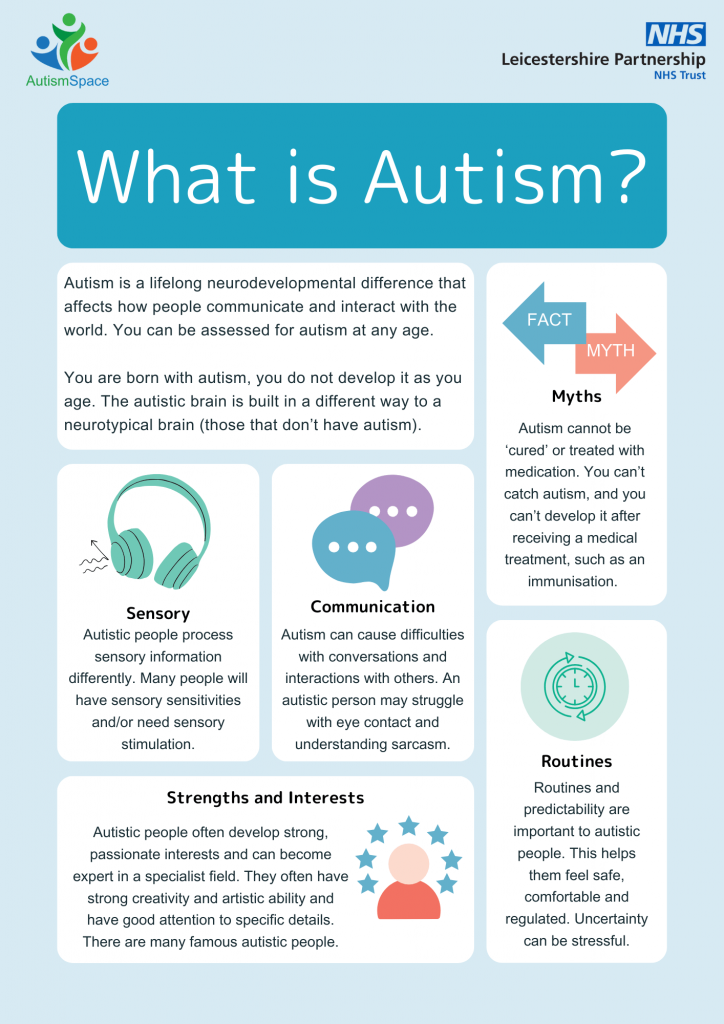For more information about this see our article – Welcome to Autism Space
In this article we clarify the facts and dispel some myths.
Here is our quick definition of autism:
Autism explained in more detail
In essence, autism is a difference in neurology – or what we might call ‘brain wiring’. A person is autistic from birth and throughout their entire lifespan.
The continual development of autism research and knowledge has brought about significant changes in how we now understand autism and autistic people.
Overall, these developments in autism knowledge are positive for autistic people.
Nowadays, most autistic people and medical experts agree that autism is a normal aspect of human diversity. It is not something that needs to be fixed or cured.
Click here to view a transcript of this video
Is autism a disability?
It is important to recognise that legally, autism is recognised as a disability. This provides autistic people with certain protections and rights under the Equality Act (2010).
This is because autistic people are a minority group whose needs are not yet fully understood or addressed within wider society – as they often face barriers when trying to access education, employment, health care and community services.
However, because each autistic person is unique in how they manage to function in everyday life, not all autistic people identify as disabled.
Some autistic people have significant difficulties, differences and challenges that have a considerable impact on their daily functioning. Even with the best possible reasonable adjustments and support in place, these people would still encounter many difficulties and are more likely to identify as disabled.
Whereas some autistic people, particularly those who have developed strategies to manage their individual ways of thinking and interacting and / or who live amongst people and in environments that are well adapted to their needs, may not identify as disabled at all.
Others may even describe autism as their ‘superpower’. For example, they may have gained expertise in their unique intense interests, enabling them to gain satisfaction, respect, and financial security from working in this field.
And some autistic people have fluctuating levels of needs – and may only identify as disabled sometimes and in some situations.
So, just like there is no ‘one size fits all’ definition of an autistic person, there is also no ‘one size fits all’ answer to the question ‘Is autism a disability?’
Thankfully, knowledge about autism is more readily accessible than ever before. Though change is slow, this growing knowledge can:
- improve our understanding of autism and autistic people
- help autistic people to understand themselves better
- foster a greater understanding of what sorts of things can help autistic people to reduce or manage their stressors and challenges
- encourage everyone to find ways to improve the health and wellbeing of autistic people – so they can thrive
Click here to find out more about:
- Autism and neurodiversity
- Why autistic people face more challenges than most people
- Common autistic strengths
- Other neurodevelopmental differences
Or click here for a clear and simple explanation of autism from the NHS.
Dispelling some myths about autism
- Autistic people can have any level of intelligence
- Some may have a learning disability
- Others may have average or above average intelligence
- Autistic people can have any level of language ability
- Some may be non-speaking or partially speaking throughout their lives
- Some non-speaking children may develop speech as they grow up
- Some verbally fluent autistic people may be situationally mute (often known as ‘selective mutism’), meaning that in some situations or at sometimes, they are unable to speak
- Some autistic people have a good level of ability to understand spoken language
- Some autistic people have difficulties understanding spoken language
- Never assume that because a person is unable to speak that they do not understand you
- Many autistic people have mental health conditions such as anxiety or depression
- For many, this can be linked to difficulties coping in a society that does not readily meet autistic needs
- Mental health conditions are not part of autism or directly caused by autism
- There is no clear reason what causes autism
- Autism is not caused by bad parenting, vaccines, or diet
- It is not something you can develop or ‘catch’ after birth
- It can affect people in the same family. This means it can sometimes be passed on to a child by a parent
Autism is not a ‘one size fits all’ label
Autistic people have similarities in their neurology and thinking styles. These can be generalised and broken down into categories – which can help our understanding of autism and autistic people.
The main areas of difference are with the following:
- communication, interaction, and relationships
- sensory processing
- a need for predictability, sameness, and repetition
- intense thinking and interests
- information processing
- executive functioning
Click this link to find out more information about autistic differences and difficulties.
However, despite these similarities – every single autistic person is different from all others.
Each has their own unique profile of communication style, behaviours, differences, difficulties, needs and strengths.
This is what is meant when people talk about the autism spectrum. Though it is important to recognise that the autism spectrum is not linear
This means that there is not one end of the spectrum where some people are ‘mildly autistic’ and another end where some people are ‘severely autistic’.
Here are some important points to note about the different ways autism affects individual people – and why it is best to avoid terms such as ‘high functioning’ and ‘low functioning’
- Some autistic people need a high level of reasonable adjustments and support from other people throughout the whole of their lives
- Some autistic people may have differences, difficulties and needs that are not obvious in their behaviour
-
- This is because some autistic people ‘mask’. To find out more about masking, click this link.
- They may struggle to get the reasonable adjustments and support they need. This can require extra effort and energy output when compared to most neurotypical people
- Some autistic people can manage day to day life, most of the time, with limited support or reasonable adjustments
- Sometimes this is because they live in an environment and amongst other people that have adapted to meet their needs
- But sometimes this is because they make extra efforts and / or take extra time when compared to most neurotypical people. This often comes at a cost
- Some autistic people have fluctuating abilities and needs
- It can be difficult for them to get support because of the false expectation that if they are sometimes able to do something, they should always be able to do it
- Autistic people often have strengths in certain areas and weaknesses in others. For example, a person may be very capable of reading and discussing complicated information about philosophy but find it difficult to make a piece of toast.
- It can be challenging for them to get support because of the false expectation that if they are able to do things that seem difficult and complex to most people, they should also be able to do things that most people find relatively easy
- When autistic people’s needs are not recognised, understood, or met and when autistic people expend extra energy to compensate for this, it can lead to anxiety, low mood and eventually even to burnout.
- To find out more about burnout, Click this link.
Summary
- Autism is a lifelong developmental difference in neurology (‘brain-wiring’)
- It affects how people think, feel behave, communicate, and interact with the world around them
- No two autistic people are the same and there is no ‘one size fits all’ way to support autistic people
- Finding out and recognising each individual autistic person’s differences, difficulties, needs, and strengths is a vital in helping autistic people live happy, healthy, and fulfilling lives
To download or print this graphic as a pdf please click here
Sources
An Experience Sensitive Approach to Care With and For Autistic Children and Young People in Clinical Services –Pavlopoulou et al, 2024.
Silberman, S. (2015). NeuroTribes: The legacy of autism and the future of neurodiversity. Avery.














